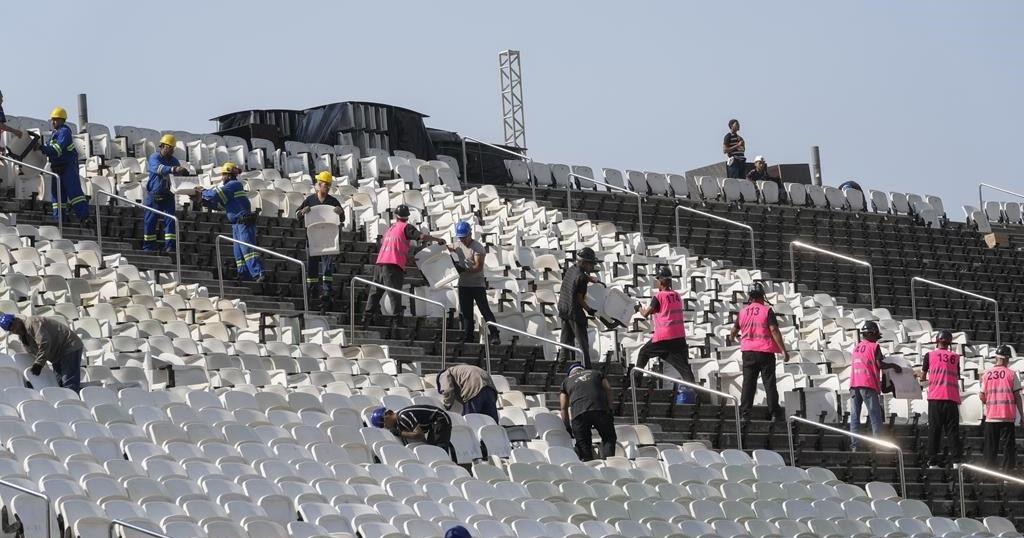SAO PAULO (AP) — Brazilian soccer club Corinthians, the team turning over its stadium for the first NFL game to be played in South America, dislikes anything green so much that its executives tried to paint the field black about a decade ago.
Players can be fined if they are spotted wearing clothes or shoes of that color, and sponsors need to adapt if they want to be associated with a club that has more than 35 million fans.
It’s all done in an effort to steer Corinthians fans away from any reference to local rival Palmeiras, the team they have been feuding with for more than a century.
On Friday, however, NeoQuimica Arena will be awash in green when the Green Bay Packers and the Philadelphia Eagles play the second game of the NFL season in Sao Paulo.
The Eagles are the designated host team. In an attempt to sway some Brazilian fans to their side, they will wear black helmets, white jerseys and black pants — Corinthians colors.
A Corinthians official told The Associated Press on Sunday that the move came after a request by its president, who claimed green was only allowed for visiting teams. The person spoke on condition of anonymity because the person was not authorized to discuss the matter publicly.
The Packers will play in their traditional white, yellow and green jersey — similar to the colors of Brazil’s national flag.
Earlier on Thursday, the Packers made a gaffe by giving Corinthians goalkeeper Hugo Souza a green Packers jersey with the name of the Brazilian club on the back, which irritated many of its fans on social media.
Many Palmeiras supporters who will be among the 42,000 expected spectators at the game have said on their social media channels that they will wear green no matter what, with many of them cheering for the Packers after the Eagles decided to avoid their usual colors.
“Corinthians and Palmeiras are branches from the same tree. The rivalry between them exists since before they played each other for the first time in 1917 and Palmeiras was still named Palestra Italia,” said Celso Unzelte, who wrote or co-wrote 24 books about soccer. “Corinthians was founded in 1910 and Palestra Italia came four years later after it gathered players of Italian origin from several other clubs in Sao Paulo. One was a Corinthians great, Bianco Gambini. He became a great for Palestra Italia too, and really soured the relationship.”
Since Gambini joined Palmeiras, the rivalry between the two Sao Paulo soccer giants only grew as they often played each other for trophies. The animosity between them reached a new high in 1969 after a car crash that killed two Corinthians players, 22-year-old defender Lidu and 24-year-old striker Eduardo.
The Sao Paulo state championship was underway, and Corinthians wanted to bring two new players to replace the victims. All other clubs agreed, except one.
“I don’t speak the name of that club and I don’t wear green since those days,” said 75-year-old Renato Messina, a journalist and former player of the Corinthians academy team. “It was hard on my father because he supported that other club. Whenever he was wearing their shirt, I didn’t come anywhere near him. I never forgot how they refused to be good sportspeople in that case. I couldn’t care less about football, but I will watch it just to cheer against whoever is wearing green.”
Green has been a forbidden color wherever Corinthians was playing since the 1970s. Back then, it was usual to hear chants of “take it off” whenever an unwary fan appeared in the stands wearing any clothing of that color. The tradition is so embedded in the club’s culture that the only people wearing green during matches at the NeoQuimica Arena are visiting players and fans.
The rejection of green has become even more prominent at Corinthians in recent years as the club has struggled financially and watched Palmeiras win major titles. The two were in opposite roles a decade ago, but even then, the no-green policy was still in place.
In December 2012, only days after Palmeiras was relegated to the second division, then-South American champion Corinthians was to play English club Chelsea in the Club World Cup final in Japan. The Brazilian team did not accept the green warmup vests offered by tournament organizers. Eventually, Corinthians used the red ones initially given to Chelsea. The Brazilians won 1-0.
Claudia Luane was one of those supporters who traveled to Tokyo 12 years ago. She has regularly attended Corinthians matches for the last two decades. She travels with the team when she can, avoids wearing green most of the time and cheers against Palmeiras “in every possible sport.” But she isn’t going to cheer against the Packers — the only community-owned team in the NFL.
“I like how they have a lot of regular people running a football team. The Packers seem to be a team of the people. We are that, too. That’s more important than the colors they wear,” the 43-year-old Luane said, dressed all in black, before Corinthians’ 2-1 win over Flamengo on Sunday in a Brazilian league match. “We are fighting against relegation this year and our rival is once again fighting for the title. But see all this crowd? Stadium packed again. I am sure the Packers have the same vibe.”
Even if they do wear green.
___
AP NFL:

























